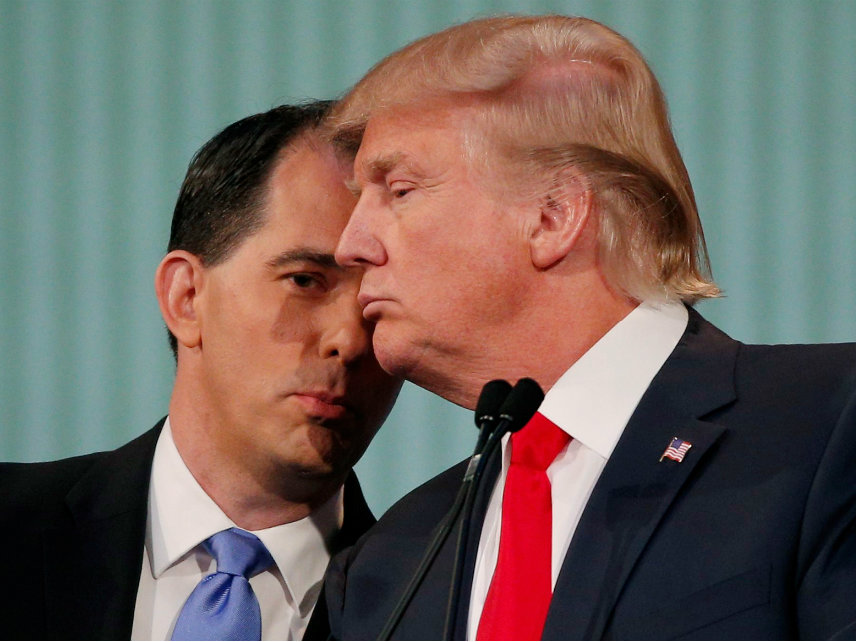Will Cronyism Doom Scott Walker's Re-election? Here's What to Watch in Next Week's Gubernatorial Races.
Two other Republican incumbents in the Midwest could also be in trouble. And Stacey Abrams could become America's first black female governor.

Two years ago, it was Donald Trump's victory in Wisconsin—an unexpected result that he seemingly never tires of recapping—that effectively clinched his win over Hillary Clinton.
Next week, another close race in Wisconsin will go a long way towards determining whether Election 2018 is a blue wave or a tsunami.
The Badger State is one of three places—along with neighboring Iowa and Illinois—where incumbent Republican governors appear to be in danger of losing to Democratic challengers. In a year where there are few high-profile gubernatorial bouts, the Midwest offers Democrats the best opportunity to make gains at the state level. It will also provide the first test of whether Trump's Rust Belt success in 2016 was an outlier result or a sign of things to come for both major parties.
For Wisconsin Gov. Scott Walker, it's another campaign with national implications. He's running for a third term in office, but has already won three statewide elections—in 2012, he became the first governor in American history to survive a recall election, spurred by organized labor groups angry about Walker's public sector union reforms. After an early exit from the 2016 GOP primary, Walker has seen his status as a rising Republican star fade a bit.
Tony Evers, the state superintendent of public education, has promised to spend more money on education and is backed by the same political coalition that has lost to Walker three times before. But this year is different. The most recent Marquette University poll, released on October 31, found the race deadlocked at 47 percent for both candidates—while Libertarian gubernatorial candidate Phil Anderson got 5 percent.
The race is close, in part, because the state's Democratic base is eager to deliver a blow to Trump, who has a negative approval rating in Wisconsin. But Walker has hurt his own case for reelection with a high-profile giveaway of taxpayer dollars to Taiwanese manufacturing giant Foxconn, which says it will bring 13,000 jobs to a new plant in the Milwaukee suburbs after Walker promised $4.5 billion in state and local tax incentives. The deal also includes the use of eminent domain to remove residents of Mt. Pleasant, Wisconsin, from where the new facility is to be built.
The deal, in short, is exactly the kind of thing that should turn off principled conservatives—and pretty much all taxpayers. A September poll by Marquette University found that only 39 percent of Wisconsinites believed the Foxconn deal was worth it. In a close race, Walker may rue the marginal political costs of the giveaway.
Elsewhere in the Midwest, Iowa Republican Gov. Kim Reynolds is facing a stiff challenge from businessesman Fred Hubbell, a Democrat and political neophyte seeking elected office for the first time. Even moreso than in Wisconsin, this race is being driven by national issues. Trump's tariffs have angered farmers and helped boost Democrats' chances—and the backlash against Rep. Steve King's (R–Iowa) support for European white nationalists could be a factor, too.
The Republican incumbent who most certainly appears doomed is Illinois Gov. Bruce Rauner, who trails Democratic challenger J.B. Pritzker by double-digits in most polls. It's tempting to look at this as the pendulum swinging back. After all, Illinois is a solidly blue state. But GOP governors who scored equally surprising victories in Maryland and Massachusetts in 2014 are both cruising towards re-election. Illinois is a mess, and even though that's not Rauner's fault, voters appear ready to punish him for a protracted budget stalemate in 2014 that didn't materially improve the state's fiscal condition.
Rauner had some good ideas (though struggled to communicate them effectively) that could have helped Illinois' sad state of affairs, but his impending defeat is a reminder of how difficult it can be to steer a state back from the edge—and, relatedly, how important it is for policymakers to avoid following Illinois' path in the first place. Pritzker wants to hike Illinois' income tax rates, which is unlikely to solve the state's spending problems (and likely to drive more people out of the state).
Outside the Midwest, the most watched race is likely to take place in Georgia, where Stacey Abrams could become the first black woman elected governor of any state. Barack Obama and Oprah Winfrey have campaigned for Abrams, who finds herself in a virtual dead heat with Republican Brian Kemp, the current secretary of state. Kemp's office is responsible for overseeing elections in the state, and his refusal to recuse himself in the event of a recount is a bad look. Libertarian Ted Metz is polling in the low single-digits, but could play a role if the race is particularly tight; under Georgia election rules, a runoff election is required if no candidate gets an outright majority of the vote.
Other close races are expected in typical swing states like Ohio and Florida; traditionally red Kansas; and deep blue Connecticut.
But the results in Georgia and Wisconsin are likely to drive the narrative on Wednesday morning.
In Abrams, Democrats have a potentially history-making candidate in a state that's crucial to the party's hopes of cracking the Republican stronghold in the Deep South.
A defeat for Walker, meanwhile, might signal to Republicans that there are consequences for espousing one thing and doing another. The man who is in many ways the face of the GOP's Tea Party era abandoned those small government principles by embracing massive corporate subsidies and kicking people out of their homes. The actions that have Wisconsin voters so angry right now are a microcosm of the GOP's corporatist behavior in the age of Trump.


Show Comments (43)